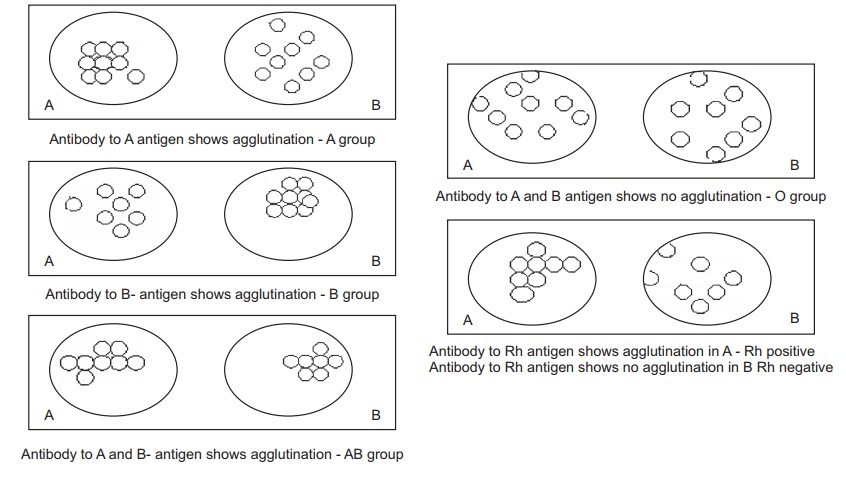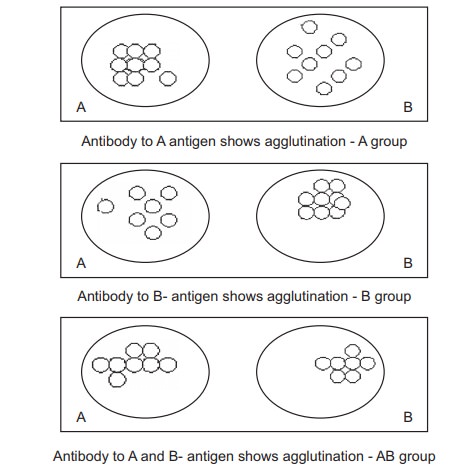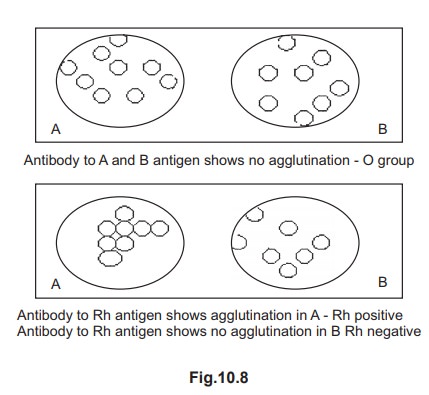Chapter: Biochemistry: Immunology
Blood groups

Blood groups
In 1901 Karl Landsteiner discovered that when
the Blood of one human being was transfused with that of another human being,
differences in their Blood leads to shock, jaundice, and renal failure. Since
the blood group antigen and antibody reactions result in the agglutination
reaction the antigen is known as
agglutinogen and the antibody is
known as agglutinin. Blood group antigens are present on the RBC membrane.
According to Land Steiner when an agglutinogen is present on the RBC membrane
the corresponding antibody is absent in the plasma. So your ‘blood group’
depends on type antigens which found on the surface of the red blood cell
membrane.
1. ABO System
Land Steiner found two types of antigens on the
RBC they are antigen A and antigen B, similarly there are two types of
antibodies in the plasma called antibody alpha and beta antibody. Since this
antigen antibody involved in agglutination reactions the antigen is called as
agglutinogen and the antibody is known as agglutinin.According to Land
Steiner’s law when an agglutinogen is present on the RBC the corresponding
antibody will be absent in the plasma.Based on the presence or absence of
antigens and antibodies human blood is classified into four major groups namely
A,B, AB and O.
Blood group A
If you belong to the blood group A, you have A
antigens on the surface of your red blood cells and beta antibodies in your
blood plasma.
Blood group B
If you belong to the blood group B, you have B
antigens on the surface of your red blood cells and alpha antibodies in your
blood plasma.
Blood group AB
If you belong to the blood group AB, you have
both A and B antigens on the surface of your red blood cells and both alpha and
beta antibodies are absent in your blood plasma.
Blood group O
If you belong to the blood group O (null), you
donot have the A and B antigens on the surface of your red blood cells but you
have both alpha and beta antibodies in your blood plasma.
Rhesus types
It is also like the blood group antigen and also
present in the cell membrane. Since this antigen was found in Rhesus monkey
first they called this antigen as Rhesus antigen or Rh system. Most people are
‘rhesus positive’ as they have rhesus antigens on their red blood cells. But,
about 3 in 20 people do not have rhesus antigen and are said to be ‘rhesus
negative’.


How is blood group testing done?
Basically, a sample of blood is mixed separately
with anti-A antibodies, anti B antibody and Rh antibodies. If the red cells to
clump together with anti-A antibodies, then it indicate the presence of A
antigens in the blood cells and the person belongs to A group. Similarly if
agglutination reaction occurs with anti B antibodies then it indicates the presence
of B antigen. When agglutination is found in both anti A and anti B antibodies
it indicates that the person belongs to AB group. If no agglutination found
with both antibodies of A and B then it indicates the absence of antigens and
the person belongs to O group.
Similarly if an anti Rh antibody shows
agglutination with the given blood then it indicates the presence of Rh
antigens on the blood cells. Hence the person is Rh positive. If no
agglutination seen then the person is Rh negative.
Blood groups and pregnancy
The blood group test is a must for pregnant
women. If the mother is Rh negative, and the fetus is Rh positive (inherited
from a Rh positive father), when the fetal blood enters in to mothers body due
to some reason the mother become sensitized. The mother’s immune system produce
antibody against the Rh antigen. When these antibodies enter in to fetus, these
may attack and destroy the baby’s blood cells. When there is a reduction in the
functional RBC, the immature blast cells come to the fetal circulation. This
condition is called ‘Erythro blastosis fetalis (Because erythroid (red blood
cells) blast cells are found in the fetus). However, without treatment, this
can become a serious problem in subsequent pregnancies as the mother’s immune
system will be ‘sensitized’ after the first pregnancy. The baby with this
disorder will have anemia, jaundice and in many cases the mental retardation.
Antigens and natural antibodies of ABO blood groups:
Isoantibodies
:(Iso means belonging
to the same species) Isoantibody is anantibody produced by one individual that
reacts with the antigen of another individual of the same species. Antibody – A
and Antibody – B are called Isoantibodies.
Isoantigens
:An antigen of an
individual which is capable of eliciting an immuneresponse in individuals of
the same species who are genetically different and who do not possess that
antigen is called isoantigen.
Natural
antibodies :Human forms
antibodies against the blood group antigensthey do not express. These antibodies
are called naturally occurring antibodies or isoagglutinins. It may be of IgM,
IgG or IgA. Antibody production starts at 3 months of age, reaches its highest
level during adult and decreases with advancing age. Usually, Antibody A titers
are higher than Antibody- B.
Related Topics